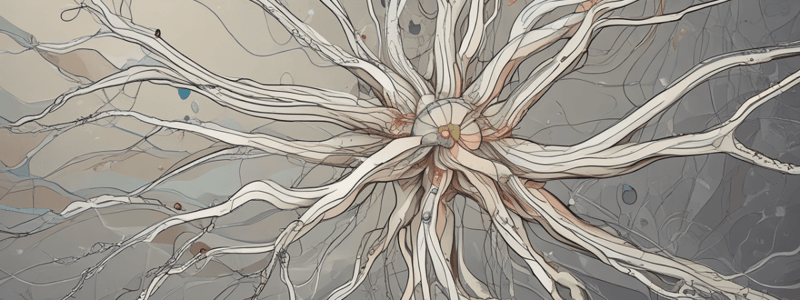Podcast
Questions and Answers
What is the primary function of neurons in the nervous system?
What is the primary function of neurons in the nervous system?
- Regulating and protecting neurons
- Producing oligodendrocytes and astrocytes
- Providing mechanical support to other neurons
- Processing, transferring, and storing information (correct)
Which type of cell does not have axons or dendrites?
Which type of cell does not have axons or dendrites?
- Motor neurons
- Interneurons
- Glial cells (correct)
- Sensory neurons
What is the primary reason for the resting membrane potential in a neuron?
What is the primary reason for the resting membrane potential in a neuron?
- The absence of ion channels in the plasma membrane
- The presence of more open Na+ channels than K+ channels
- The presence of equal number of open K+ and Na+ channels
- The presence of more open K+ channels than Na+ channels (correct)
What is the main difference between the central nervous system and peripheral nervous system in terms of glial cells?
What is the main difference between the central nervous system and peripheral nervous system in terms of glial cells?
What is the term for the membrane potential of a neuron that is not transmitting signals?
What is the term for the membrane potential of a neuron that is not transmitting signals?
What is the ratio of glial cells to neurons in the nervous system?
What is the ratio of glial cells to neurons in the nervous system?
What is the primary function of the dura mater in the central nervous system?
What is the primary function of the dura mater in the central nervous system?
Which of the following best describes the peripheral nervous system?
Which of the following best describes the peripheral nervous system?
What is the function of the cerebrospinal fluid between the pia mater and arachnoid mater?
What is the function of the cerebrospinal fluid between the pia mater and arachnoid mater?
What is the function of the pia mater in the central nervous system?
What is the function of the pia mater in the central nervous system?
What is the arachnoid mater responsible for in the central nervous system?
What is the arachnoid mater responsible for in the central nervous system?
What is the central nervous system (CNS) composed of?
What is the central nervous system (CNS) composed of?
What is the primary cause of depolarization during the depolarization phase of an action potential?
What is the primary cause of depolarization during the depolarization phase of an action potential?
During which phase of the action potential does the membrane potential return to its resting state?
During which phase of the action potential does the membrane potential return to its resting state?
What is the primary mechanism by which the membrane depolarizes further during the depolarization phase of an action potential?
What is the primary mechanism by which the membrane depolarizes further during the depolarization phase of an action potential?
What is the primary difference between the absolute and relative refractory periods?
What is the primary difference between the absolute and relative refractory periods?
What is the voltage level at which depolarization occurs very rapidly during the depolarization phase of an action potential?
What is the voltage level at which depolarization occurs very rapidly during the depolarization phase of an action potential?
What is the term for the period during which a nerve fiber does not respond or responds subnormally to a stimulus of threshold intensity or greater than threshold intensity?
What is the term for the period during which a nerve fiber does not respond or responds subnormally to a stimulus of threshold intensity or greater than threshold intensity?



